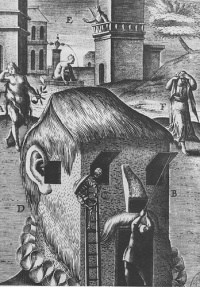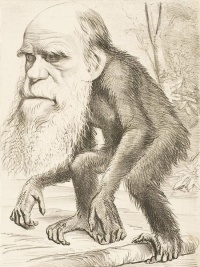Darwinism
From The Art and Popular Culture Encyclopedia
|
Related e |
|
Featured: |
- The principles of natural selection set out by Charles Darwin in The Origin of Species (1859) and other writings.
- The evolution and common ancestry of all living and extinct species resulting from gradual evolutionary mechanisms such as natural selection.


Welcome to Art and Popular Culture, a nobrow wiki for the loftiest of intellectuals and the most jaded hedonists; exploring the hidden links between "mainstream" and "underground" culture.
Methodology
- "Method of this work: literary montage. I have nothing to say only to show. [...]" -- Walter Benjamin
- This website is a "rhizome" and allows for multiple, non-hierarchical entry and exit points. --J. W. Geerinck
Philosophy
- “In the illusory babels of language, an artist might advance specifically to get lost, and to intoxicate himself in dizzying syntaxes, seeking odd intersections of meaning, strange corridors of history, unexpected echoes, unknown humors, or voids of knowledge… but this quest is risky, full of bottomless fictions and endless architectures and counter-architectures… at the end, if there is an end, are perhaps only meaningless reverberations.” --"A Museum of Language in the Vicinity of Art" (1968) by Robert Smithson
Darwinism is a set of movements and concepts related to ideas of transmutation of species or of evolution, including some ideas with no connection to the work of Charles Darwin.
The meaning of "Darwinism" has changed over time, and varies depending on who is using the term. In the United States, the term "Darwinism" is often used by creationists as a pejorative term, but in the United Kingdom the term has no negative connotations, being freely used as a short hand for the body of theory dealing with evolution, and in particular, evolution by natural selection.
The term was coined by Thomas Henry Huxley in April 1860, and was used to describe evolutionary concepts, including earlier concepts such as Malthusianism and Spencerism. In the late 19th century it came to mean the concept that natural selection was the sole mechanism of evolution, in contrast to Lamarckism.
Around 1900 Darwinism was eclipsed by Mendelism until the modern evolutionary synthesis unified Darwin's and Gregor Mendel's ideas. As modern evolutionary theory has developed, the term has been associated at times with specific ideas.
While the term has remained in use amongst scientific authors, it has increasingly been argued that it is an inappropriate term for modern evolutionary theory. and as a result had only a vague and inaccurate understanding of heredity. He naturally had no inkling of yet more recent developments and, like Mendel himself, knew nothing of genetic drift for example.
Derived terms
Related terms



